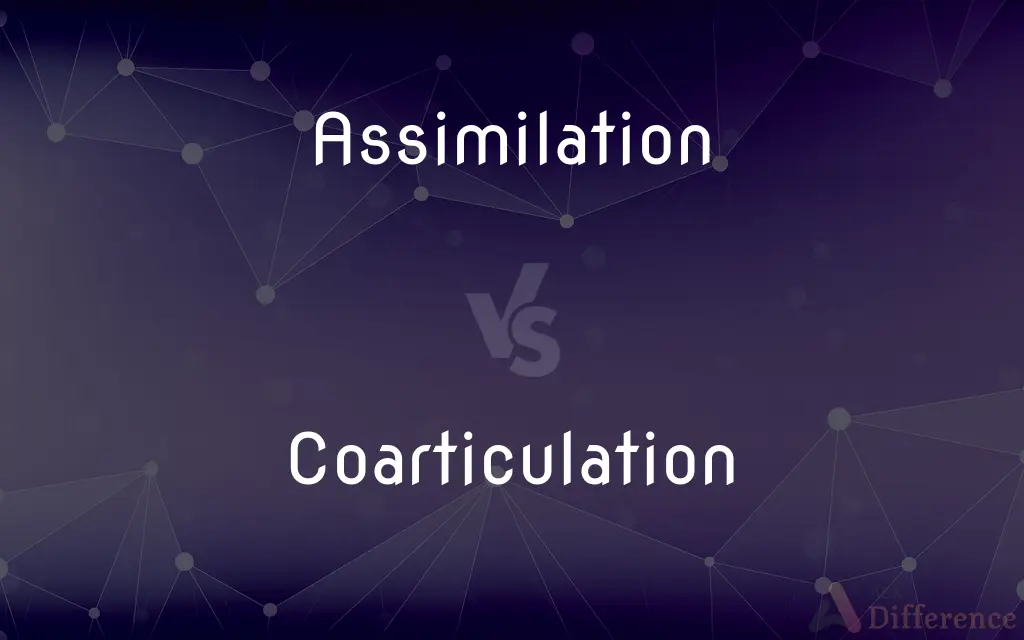Assimilation vs. Coarticulation — What's the Difference?

Difference Between Assimilation and Coarticulation
ADVERTISEMENT
Compare with Definitions
Assimilation
The process of taking in and fully understanding information or ideas
The assimilation of the knowledge of the Greeks
Coarticulation
Coarticulation in its general sense refers to a situation in which a conceptually isolated speech sound is influenced by, and becomes more like, a preceding or following speech sound. There are two types of coarticulation: anticipatory coarticulation, when a feature or characteristic of a speech sound is anticipated (assumed) during the production of a preceding speech sound; and carryover or perseverative coarticulation, when the effects of a sound are seen during the production of sound(s) that follow.
Assimilation
The absorption and digestion of food or nutrients by the body or any biological system
Nitrate assimilation usually takes place in leaves
Coarticulation
(anatomy) The formation of a joint by the articulation of two bones.
Assimilation
The process of becoming similar to something
Watson was ready to work for the assimilation of Scots law to English law where he thought it was justified
ADVERTISEMENT
Coarticulation
(linguistics) The action or process of coarticulating.
Assimilation
The act or process of assimilating.
Coarticulation
The union or articulation of bones to form a joint.
Assimilation
The state of being assimilated.
Assimilation
(Physiology) The conversion of nutriments into living tissue; constructive metabolism.
Assimilation
(Linguistics) The process by which a sound is modified so that it becomes similar or identical to an adjacent or nearby sound. For example, the prefix in- becomes im- in impossible by assimilation to the labial p of possible.
Assimilation
The process whereby a minority group gradually adopts the customs and attitudes of the prevailing culture.
Assimilation
The act of assimilating or the state of being assimilated.
Assimilation
The metabolic conversion of nutrients into tissue.
Assimilation
(by extension) The absorption of new ideas into an existing cognitive structure.
Assimilation
(phonology) A sound change process by which the phonetics of a speech segment becomes more like that of another segment in a word (or at a word boundary), so that a change of phoneme occurs.
Assimilation
The adoption, by a minority group, of the customs and attitudes of the dominant culture.
Assimilation
The act or process of assimilating or bringing to a resemblance, likeness, or identity; also, the state of being so assimilated; as, the assimilation of one sound to another.
To aspire to an assimilation with God.
The assimilation of gases and vapors.
Assimilation
The conversion of nutriment into the fluid or solid substance of the body, by the processes of digestion and absorption, whether in plants or animals.
Not conversing the body, not repairing it by assimilation, but preserving it by ventilation.
Assimilation
The state of being assimilated; people of different backgrounds come to see themselves as part of a larger national family
Assimilation
The social process of absorbing one cultural group into harmony with another
Assimilation
The process of absorbing nutrients into the body after digestion
Assimilation
A linguistic process by which a sound becomes similar to an adjacent sound
Assimilation
The process of assimilating new ideas into an existing cognitive structure
Assimilation
In the theories of Jean Piaget: the application of a general schema to a particular instance
Share Your Discovery

Previous Comparison
Globular vs. Spherical
Next Comparison
Attacker vs. Striker














































